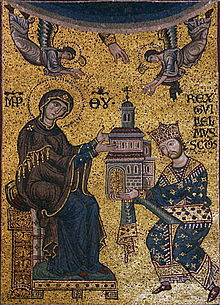| William II | |
|---|---|
 William II offering the Monreale Cathedral to the Virgin Mary. | |
| King of Sicily | |
| Reign | 7 May 1166 – 11 November 1189 |
| Predecessor | William I |
| Successor | Tancred |
| Born | December 1153 Palermo, Kingdom of Sicily |
| Died | 11 November 1189 (aged 35) Palermo, Kingdom of Sicily |
| Burial | |
| Spouse | Joan of England |
| House | Hauteville |
| Father | William I of Sicily |
| Mother | Margaret of Navarre |
William II (December 1153 – 11 November 1189), called the Good, was king of Sicily from 1166 to 1189. From surviving sources William's character is indistinct. Lacking in military enterprise, secluded and pleasure-loving, he seldom emerged from his palace life at Palermo. Yet his reign is marked by an ambitious foreign policy and a vigorous diplomacy. Champion of the papacy and in secret league with the Lombard cities, he was able to defy the common enemy, Frederick Barbarossa.[1] In the Divine Comedy, Dante places William II in Paradise. He is also referred to in Boccaccio's Decameron (tale IV.4, where he reportedly has two children, and tale V.7).
William was nicknamed "the Good" only in the decades following his death. It is due less to his character than to the cessation of the internal troubles that plagued his father's reign and the wars that erupted under his successor. Under the Staufer dynasty his reign was characterised as a golden age of peace and justice.[2] His numeral is contemporary and he himself used it.[a]
- ^ One or more of the preceding sentences incorporates text from a publication now in the public domain: Curtis, Edmund (1911). "William II. of Sicily". In Chisholm, Hugh (ed.). Encyclopædia Britannica. Vol. 28 (11th ed.). Cambridge University Press. p. 671.
- ^ Runciman 2012, p. 7.
- ^ Travaini 1991, p. 167.
Cite error: There are <ref group=lower-alpha> tags or {{efn}} templates on this page, but the references will not show without a {{reflist|group=lower-alpha}} template or {{notelist}} template (see the help page).